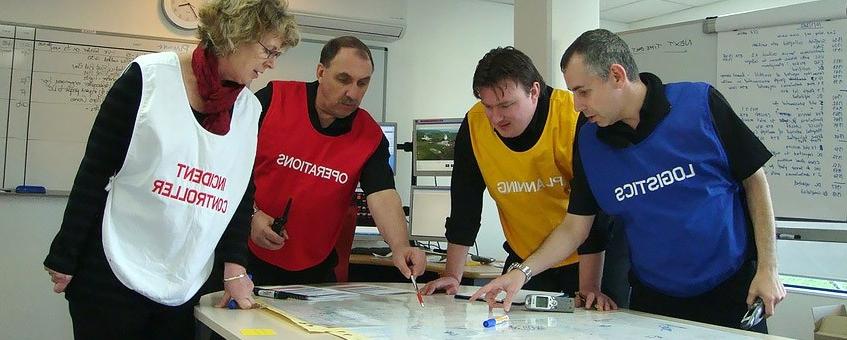
Homeland Security and Emergency Management
Associate Degree Program
The Homeland Security and Emergency Management Associate Degree provides students with entry-level knowledge and skills in the ever-adjusting field tasked with safeguarding our lives from natural and man-made threats and vulnerabilities.
The program focuses on key strategies related to "all-hazards" planning, mitigation, response and recovery prevention or pre-event planning, mitigation, post-event response, and recovery for crisis events. This program also focuses on the mutual aid efforts between various State and Federal agencies such as law enforcement, military, security and medical before, during and after such events to protect persons, and assets pertaining to finances and physical properties.
The coursework provides students with the knowledge and skills needed for protection, security, law enforcement, and management positions in public, private, local, state, and federal agencies.
Offered at the following campus(es): Dover
What You Can Do
In this program, you will gain the knowledge and skills to prepare you for positions such as:
- Law Enforcement, Emergency and Medical Responders, Planners or practitioners
- Federal, State, local and private Emergency Responders and Planners
- Military and Intelligence personnel
- Security Officers
- Facility or plant operators
What You Will Learn
Program Graduate Competencies
The Program Graduate Competencies listed below identify the major learning goals related to your specific program of study and identify the knowledge and skills you will have when you graduate to be successful in your chosen field.
- Articulate the roles and responsibilities of key Criminal Justice and Homeland Security agencies and organizations.
- Demonstrate "all-hazards" planning, mitigation, response and recovery.
- Apply mitigation and crisis intervention strategies used by integrated disaster response teams to diverse citizen populations.
- Articulate the psychology and history of domestic and international terrorism.
Core Curriculum Competencies
The Core Curriculum Competencies listed below identify what you will be able to do as a graduate, regardless of your program of study. You will acquire these core competencies through general education courses and program-specific coursework. You will be expected to use relevant technology to achieve these outcomes:
- Apply clear and effective communication skills.
- Use critical thinking to solve problems.
- Collaborate to achieve a common goal.
- Demonstrate professional and ethical conduct.
- Use information literacy for effective vocational and/or academic research.
- Apply quantitative reasoning and/or scientific inquiry to solve practical problems.
Suggested Pathway to Graduation
Semester 1
| Number | Course Title | Credits |
|---|---|---|
| SSC 100 | First Year Seminar | 1 |
| HDM 101 | Introduction to Homeland Security and Emergency Management | 3 |
| PSY 121 | General Psychology | 3 |
| MAT 152 | Quantitative Reasoning | 3 |
| SOC 111 | Sociology | 3 |
| ENG 101 | Composition I | 3 |
Semester 2
| Number | Course Title | Credits |
|---|---|---|
| HDM 110 | Issues in Homeland Security and Emergency Management | 3 |
| HDM 103 | Information and Intelligence Sharing in Homeland Security | 3 |
| CIS 107 | Introduction to Computers/Application | 3 |
| HDM 105 | Environmental Hazards and Vulnerabilities | 3 |
| ENG 102 | Composition II | 3 |
Semester 3
| Number | Course Title | Credits |
|---|---|---|
| CRJ 226 | Crisis Intervention | 3 |
| HDM 244 | Introduction to Terrorism | 3 |
| HDM 204 | All-Hazards Management and Critical Infrastructure Protection | 3 |
| CRJ 222 | Constitutional Law | 3 |
| ENG 122 | Technical Writing and Communication | 3 |
| SPA 133 | Using Beginning Spanish | 3 |
| Or | ||
| SPA 136 | Spanish Communication I | 4 |
Semester 4
| Number | Course Title | Credits |
|---|---|---|
| CRJ 217 | Ethics, Professionalism, and Communication in Public Safety | 3 |
| CRJ 223 | Criminology | 3 |
| HDM 202 | First Responder | 3 |
| HDM 225 | Supervision and Leadership in Emergency Management | 3 |
To complete program requirements, you must pass the above courses and earn at least 62 credits. The number of courses and credits required for graduation may be more depending on college readiness and the elective courses offered in your program major (if electives are a part of the program).
CRJAASHDE
Pursuing a Bachelor's Degree?
This is a Connected Degree program that enables you to complete your associate degree and then transfer to a four-year degree program as a junior. See a program advisor for details!
Wilbert Bordley
Department Chair, Instructor and Program Advisor
wbordley@365dafa6.com
(302) 857-1742
This program is offered at the Dover campus.
This program is offered at the Dover campus.
This program is offered at the Dover campus.

